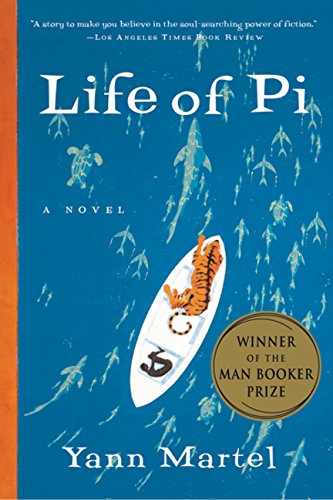All Nonfiction
- Bullying
- Books
- Academic
- Author Interviews
- Celebrity interviews
- College Articles
- College Essays
- Educator of the Year
- Heroes
- Interviews
- Memoir
- Personal Experience
- Sports
- Travel & Culture
All Opinions
- Bullying
- Current Events / Politics
- Discrimination
- Drugs / Alcohol / Smoking
- Entertainment / Celebrities
- Environment
- Love / Relationships
- Movies / Music / TV
- Pop Culture / Trends
- School / College
- Social Issues / Civics
- Spirituality / Religion
- Sports / Hobbies
All Hot Topics
- Bullying
- Community Service
- Environment
- Health
- Letters to the Editor
- Pride & Prejudice
- What Matters
- Back
Summer Guide
- Program Links
- Program Reviews
- Back
College Guide
- College Links
- College Reviews
- College Essays
- College Articles
- Back
Life of Pi by Yann Martel
Piscine Molitor Patel hasn’t had it easy. Named after a French pool no one in India cares about, Piscine decides he will be known simply as Pi; like the number; like the decimal. His family owns a zoo, which become the watering grounds of Pi’s vibrant youth. There, both the study of animals, zoology, and that of faith, religion, connect and simultaneously collide. But when his family decides to relocate its zoo to a place as far away to Pi as the moon, Canada, one fateful night on the Pacific will change everything. Shipwrecked on a meager lifeboat, and left in the company of only a hyena, an orangutan, a zebra, and a Bengal tiger named Richard Parker, the next 477 days of Pi’s existence become a relentless struggle against the elements to survive.
As someone who watched the film adaptation of Life of Pi first, the original novel had been on my reading list for some time. And when I first opened up the book, fresh off my library's Large Print shelf, I found Yann Martel’s preluding pages seasoned with a hint of adventure, cleverness, and wit, a masterful flavor that continues throughout the book.
The action scenes are breathless, the descriptions full of the wind and sea; indeed, Martel seems to have reinvigorated the traditional adventure epic so recently absent in modern fiction. Twinged with philosophical ponderings, like Pi’s excursions into the infinite world of faith, as well as the fascinating science behind the physical effects Pi experiences at sea, there seems to be something in it for everyone. And standing behind Pi throughout the novel is an intense experience, witnessing firsthand his uniquely metaphysical despair, hope, and wonder.
All the same, there seems to be a thin layer of romanticism over it all. For example, the ever rosy state of the India of Pi’s youth feel out of place in comparison to other aspects of the novel, which maintain to be unmistakably raw.
And it is seeing the tiger come to life, the terrifying, magnificent predator who we come to know as Richard Parker, certainly the most exhilarating of all. It might be hard to imagine how to characterize a tiger, but Martel does so with flawless ease; the primitive and powerful animal communication between Richard Parker and Pi evolves throughout the novel, and we see, somehow, some of Richard Parker mirrored in Pi himself, as well as the other way around. Grandiose, engaging, with adventure at the helm, the life of Pi is not one to forget.
Similar Articles
JOIN THE DISCUSSION
This article has 0 comments.

What does "THHRe" stand for? Good question! It's THE HOLY HITCHHIKE’S REVIEW...A shorter version of the Hitchhike, reviews principally concerning books, movies, and music. Enjoy, and let loose your commentary and suggestions below. A new column of THH every Friday!